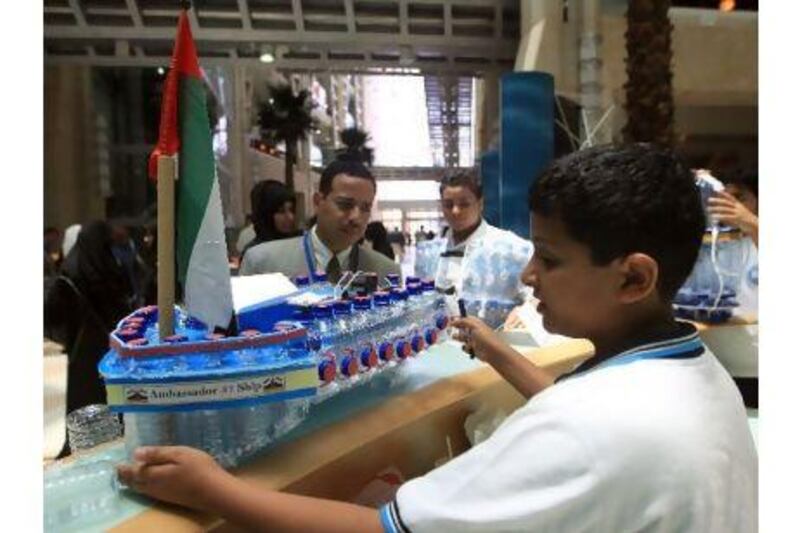AL AIN // Sporting a swimming vest fashioned from dozens of plastic bottles, Ali Soliman walked around a biology event at United Arab Emirates University yesterday, touting the virtues of recycling.
"It is bad to just throw the bottles away, and recycling is good," said the Grade 8 pupil at Glenelg School of Abu Dhabi. The device was buoyant enough to hold a person's head above water, he said. "But it is also important to set an example for smaller children to think of new ways to use things again and not throw everything away."
Ali's project was one of several on display yesterday at this year's Biology Day at the university. The event highlighted research projects that addressed topics ranging from biomedical engineering to the tolerance of plants in extreme conditions, including their viability in the event of a catastrophe such as an oil spill.
Rasha Zain al Zubaidi, a student at the university, demonstrated how a courgette plant suffered when its daily water supply contained traces of crude oil. But when the plant was given the toxic water only three times a week, it "used the hydrocarbon in the oil as a sort of food", she said.
"If you were to look at how an oil spill here would affect the plants, they will survive if they are given time and space to recover. But if they are relying on water with oil on a regular basis, they would suffer physiological changes."
Other students did similar projects with courgettes, testing how salinity in the water affected seed germination, growth and flowering. The plant could survive flooding, and was also able to adapt to frost, but its chlorophyll, the molecule that gives it its green pigment and absorbs sunlight for energy, decreased.
The event also highlighted the Biology Club's recycling campaign, inviting high school students to compete by building a sculpture or contraption from used plastic water bottles. The competition aimed to open up dialogue on the importance of recycling.
In addition to Ali's life vest, creations ranged from plastic cars and lamps to an improvised vacuum cleaner.
Ahmad al Jaberi, Ali's schoolmate, designed a working motor boat made of plastic bottles, with a UAE flag at the bow.
"We as a country have to start thinking about what we want to do with all of these bottles that we only use once, and then throw away," said the Grade 7 pupil.
Also among the research projects from UAE University's Biology Department is a study investigating how coating tiny particles of iron oxide with a biodegradable polymer could help todetect rapidly dividing cancer cells in the liver, by improving magnetic resonance imaging.
The theory is being tested on immune-deficient mice






